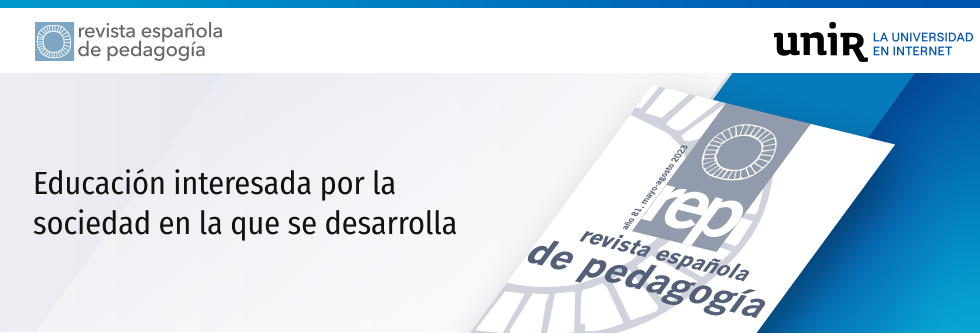Abstract
This piece argues that the Revista de Educación, and the other academic journals on education in Spain, are in general fully integrated into the academic-administrative system and that the rules that shape university life also affect academic journals.
Two types of measure are proposed to maximise the benefit from these journals’ contribution to university life: measures relating to the academic career path, which would maximise the importance of published research, and measures relating to the evaluation of academic publications, in which the need to improve awareness of evaluation criteria and their quality is emphasised.
With regards to the academic career, it is argued that this should have a better model for progression and feature more incentives linked to six-year periods of research activity (sexenios), and that a more objective and automatic process for attaining a chair is necessary, one which is linked to individual merits and not to the specific circumstances of the universities.
To this end, it is proposed that: the number of pay grades on the academic career path should be increased, increasing the distinction in pay and standing between the entry level and top level; the number of steps on the academic career should be increased; and that the system should be more objective. This would result in a professional career that would go from having two steps (profesor titular and catedrático) to having six, linked to sexenios.
This whole design is based on recognition of sexenios and so it would be necessary to make changes to them. A system for evaluating research activity is proposed in which the evaluation criteria for academic journals are more transparent, more objective, more automatic, and, importantly, consistent over time.
This piece concludes that to optimize evaluation of academic activity, its subjects should receive feedback. If neither journals nor researchers know in detail the criteria on which they will be evaluated or the detailed results of this evaluation, this judgement becomes a summary trial and so its chances of influencing the system are severely reduced.
Cite this article as: Gaviria, J. L. (2018). Las revistas científicas en educación y el contexto académicoadministrativo. Algunas propuestas de cambio | Scientific journals in education and the academic-administrative context. Some proposals for change. Revista Española de Pedagogía, 76 (271), 519-540. doi: 10.22550/REP-3-2018-07
Referencias | References
Betancor, A. (Ed.) (2017). Código de Evaluación y Acreditación del Profesorado Universitario. Madrid: Boletín Oficial del Estado/ANECA. Retrieved from https://www.boe.es/legislacion/codigos/codigo.php?id=166_Codigo_de_Evaluacion_y_Acreditacion_del_Profesorado_Universitario&modo=1
Clarivate Analytics (2017). Journal Citation Reports 2016. Retrieved from https://jcr.incites.thomsonreuters.com
CNEAI (1996). Resolución de 6 de noviembre de 1996 de la Dirección General de Enseñanza Superior-Presidencia de la Comisión Nacional Evaluadora de la Actividad Investigadora por la que se establecen los criterios específicos en cada uno de los campos de evaluación. Madrid: CNEAI.
Delgado López-Cózar, E. (2017). Sexenios 2017, sin cambios en lo importante: número y tipo de aportaciones para obtener el sexenio. EC3 Reports, 21. doi: 10.13140/RG.2.2.30743.47521
Galán, A. (2016). La discrecionalidad técnica en la ANECA y la CNEAI: una cuestión de gran calado. Aula Magna 2.0. [Blog]. Retrieved from http://cuedespyd.hypotheses.org/2117
Galán, A., González-Galán, M. A., & RodríguezPatrón, P. (2014). La evaluación del profesorado universitario en España. Sistema nacional y divergencias territoriales. Revista de Educación, 366, 136-164.
González Alcaide, G., & Gómez Ferri, J. (2017). Análisis de las prácticas de colaboración científica: una vía hacia la excelencia. Valencia: Nau Llibres.
Ministerio de Educación y Ciencia (1994). Orden de 2 de diciembre de 1994 por la que se establece el procedimiento para la evaluación de la actividad investigadora en desarrollo del Real Decreto 1086/1989, de 28 de agosto, sobre retribuciones del profesorado universitario. BOE no. 289, of 03 December 1994. Madrid: Ministerio de Educación y Ciencia.
Ministerio de Educación, Cultura y Deporte (2017). Programa ACADEMIA de acreditación nacional para el acceso a los cuerpos docentes universitarios. Retrieved from https://www.mecd.gob.es/servicios-al-ciudadano-mecd/catalogo/general/educacion/academia/ficha/academia.html
Ministerio de Educación, Cultura y Deporte (2017). Méritos evaluables para la acreditación nacional para el acceso a los cuerpos docentes universitarios. Retrieved from http://www.mecd.gob.es/servicios-al-ciudadano-mecd/dms/mecd/servicios-al-ciudadano-mecd/catalogo/general/educacion/academia/ficha/academia/criterios-sociales-juridicas.pdf
Ministerio de Educación, Cultura y Deporte (2018). Revista de Educación. Retrieved from https://www.mecd.gob.es/revista-deeducacion/
Miras-Portugal, M. T., Alzaga, Ó., Azcárraga, J. A., Capmany, J., Garicano, L., Goñi, F., … Urrea, M. (2013). Propuestas para la reforma y mejora de la calidad y eficiencia del sistema universitario español. Retrieved from https://www.mecd.gob.es/prensa-mecd/dms/mecd/servicios-al-ciudadano-mecd/informacionpublica/audiencia-informacion-publica/cerrados/2013/sistemauniversitario/propuestasreforma.pdf
Ortiz-de-Urbina-Criado, M., & Mora-Valentín, E. M. (2013). El sistema de acreditación del profesorado a través del Programa ACADEMIA: Evolución y cambios. Revista Española de Documentación Científica, 36 (1). doi: http://dx.doi.org/10.3989/redc.2013.1.971
Prada García, A. (2018). Sombras en la evaluación de la actividad investigadora. Claves de razón práctica, 256, 90-99.
Prieto, J. M. (2014). Sobre los sexenios de investigación… ¡A publicar (pero bien)! Juan María Prieto Lobato (UVa) [Blog]. Retrieved from http://juanmariaprieto.blogs.uva.es/2014/11/28/sobre-los-sexenios-de-investigacion-a-publicarpero-bien/
Tiana Ferrer, A. (1996). Breves notas históricas a modo de presentación. Revista de Educación, special issue 1996, 5-8.
Vázquez, M. (2011). Historia de un sexenio. Miserias de la evaluación científica en España. Retrieved from http://habitat.aq.upm.es/gi/mve/valencia-20110602-textocompleto.pdf
Citación recomendada | Recommended citation
Gaviria, J.
(2018)
.
Scientific journals in education and the academic-administrative context. Some proposals for change.
Revista Española de Pedagogía, 76(271).
https://www.revistadepedagogia.org/rep/vol76/iss271/12
Licencia Creative Commons | Creative Commons License
Esta obra está bajo una licencia internacional Creative Commons Atribución-NoComercial 4.0.
This work is licensed under a Creative Commons Attribution-NonCommercial 4.0 International License
Palabras clave | Keywords
evaluationofacademicjournals, evaluationofresearchactivity, professionalincentives, universitycareerpath







